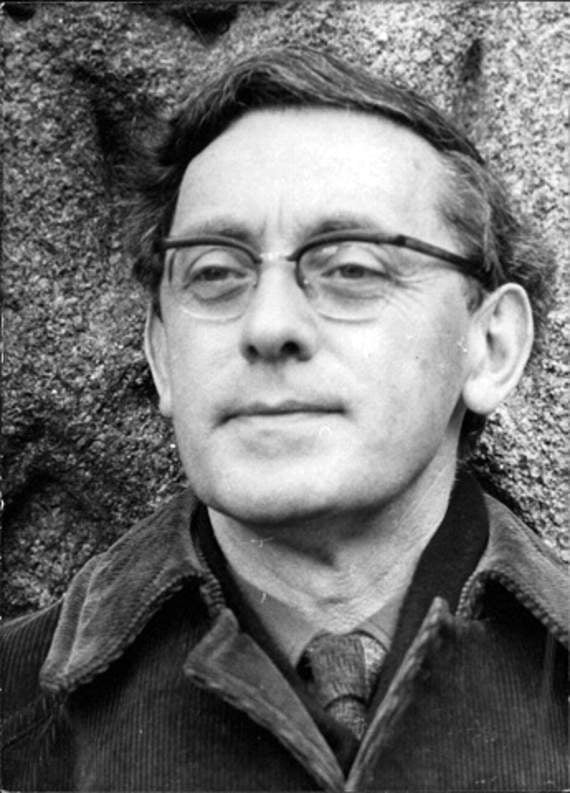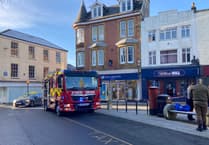‘HE seemed to be quite a man of the world’ — is how the prolific writer and poet, Charles Causley, has been described as we enter the Charles Causley Festival this week, which is marking its tenth anniversary.
Cyprus Well is a haven for creativity. It can be felt immediately as you make your way through the entrance to the small cottage, located on Ridegrove Hill in Launceston, and immerse yourself into the nostalgic presence of the Launceston poet, Charles Causley. From the countless books upon the bookshelf by his writing desk, to toy soldiers from his childhood and the reminders of all the things he loved, the memories he had cherished, and the new left behind by those he has inspired — each personal item on display seems to tell its own story and gives just a snippet of an insight into the poet and the legacy he has instilled in Launceston.
This is where the Post met the Charles Causley Trust’s programme director, Kate Campbell, on the warm morning of Thursday, May 23, to learn more about the festival and the man who inspired it all.
The town’s Causley heritage is one the community is rightfully proud of, and now the milestone ten years of the Charles Causley Festival has been reached. Fittingly, a variety of events and workshops are taking place this week to encourage people to feel inspired by the literary heritage it holds dear.
“So it’s the tenth year of the festival and the second year that it has been part of the Causley Trust,” Kate told the Post. “It’s the first year myself and my colleague have helped organise it. When I first came in, the festival had already been run through the trust. This year, we really want to raise the quality of the festival, and make it a really good quality festival that appeals to everyone.”
Charles Causley, born in 1917 at Riverside, Launceston, always stayed in his home town, despite the gradual recognition of his work. When he wasn’t writing poetry, he was teaching, and was always keen to encourage the creative freedom of his pupils at the National School, situated along St Thomas Road.
“I think there was quite a feeling before, that the festival was just about the poet,” Kate continued. “But Charles was really encouraging young people and their learning. He seemed to be someone to encourage young people to write and be creative.”
Years later, it appears Charles is still doing this. As part of the programme brochure, the artwork has been provided by Falmouth University student Bex Bourne, shadowing Causley’s life, work and the intrepid characters escaping from the countless pages of Causley’s poetic scribbles.
Bex has created a series of artistic pieces in response to Causley’s poems, and has even commissioned a map of Launceston for the back page of the programme, featuring the iconic locations in the town and all the loveable characters from Causley’s most popular pieces of poetry.
“All this, she drew and made into a digital map,” Kate said. “So that was really good because it’s supported a Cornish artist.”
Every year, the festival receives support from a variety of creatives, including patron of the Causley Trust, Patrick Gale; folk poetry and song group Story Republic, who will deliver a series of street performances on Saturday, June 8; and Kurt Jackson, who will deliver a talk at Cyprus Well on Friday, June 7 (tomorrow).
Additionally, visitors to Launceston may spot a piece of art in a variety of shop windows as part of an art exhibition overseen by Altarnun’s Terre Verte Gallery.
More than thirty pieces of artwork have been put on display in shop windows and can be seen throughout the festival’s duration.
“It’s really nice to link opportunities with people who want to be here and make this a great experience,” Kate said.
“There’s a lot of reciprocal links going on. We want people to take part and decide, we’re going to go to Cyprus Well and have a look around because we haven’t been here before — not because it’s the Causley Festival, but because there’s really interesting things going on. We wanted to have people pick up a brochure and look at it and really want to go there.
“One thing we do want to focus on is making Cyprus Well more accessible. However, we have very small budgets and very small staff, so at the moment we just don’t have the facilities to open it up to the public all the time. However, events like the festival do allow us to work towards this.”
Unlike his fellow poets, Causley kept to himself, continuing his peaceful life in his hometown of Launceston until he died in 2003. “Charles led a very low key life. He was very unassuming, but was friends with people like Ted Hughes and Seamus Heaney.”
The team behind the Charles Causley Trust is mainly made up of volunteers, having recently been joined by two interns from Plymouth University, Rose and Mitchell. However, the entire team are ‘pulling all the stops to make the festival happen’.
Within this, the trust are making the engagement of young people a priority. Kate continued: “We want to change the demographic and make this still relevant. We want to say to people, ‘why not have a go at writing?’and to try to engage younger people.
“For example, we run a young people’s poetry competition, which has now gone nationwide. We kept it Cornwall-wide for a while, but really wanted to open it up to people across the country. It’s free to enter, and the winners are awarded at the North Cornwall Book Festival at St Endellion.
“Charles had amazing empathy for a man who spent most of his life in such a small town. He had the most amazing world view. For a man who didn’t have a family — except for his mother, who died here in the 70s — he seemed to be quite a man of the world.
“Getting people to see if they would be interested in reading him again or try writing themselves is something we want to encourage — because we’re always on the lookout for the next Charles Causley.”
This is evident in the trust’s young ambassador, Isaac Cude, who has recently delivered an assembly to the sixth form students at his school, Launceston College, to encourage them to enter the trust’s young people’s poetry competition, of which he came second in 2016.
“It’s really nice to get people together,” Kate continued. “We’re trying to create opportunities to experience art and culture. We have a committee for the festival, and we want to encourage people to come along when we start having those first meetings for the next festival.”
The trust also has a partnership with three South West universities — Exeter, Plymouth and Falmouth.
“It’s really nice to get a fresh take on it. We’ve put out a call for volunteers to each of these universities so we should have a few students on board this year, handing out leaflets and brochures and helping with things like tea and coffees — just little things, to create a really nice vibe.”
To Kate, the festival is more important than ever, continuing Causley’s heritage and inspiring the next generation of creatives.
She said: “It’s pretty amazing to come in and be curator for the ten-year festival. They always say an anniversary should relate to a material — well, the ten-year mark is tin, which I thought is very fitting considering the Cornish tin industry. It was a bit of a lucky omen.
“We want to encourage people to celebrate the Cornish heritage and come and have a go at what’s going on during the festival. We’re trying to get Charles acknowledged a bit more, and we are having a ceremony for the international poetry prize at the House of Lords, so that’s one step forward in that direction.
“It’s getting people talking, and then they start talking about Launceston. It’s not just about the trust and the festival — I think it’s about the town as well. I feel very privileged to be part of that and hopefully we will continue to have a great event in the town calendar.”
As for the man himself, Kate believes his legacy will continue for many years to come.
“It’s really important to recognise the heritage he’s brought to Launceston in so many ways. For many local people, it does create a sense of pride and ownership of their town — your parents and grandparents showing you where Charles was born, where he lived.
“It’s great to show creativity and art can happen anywhere. Not only that, it shows young people that they can have the same opportunities here. There is a sense of pride in their community.”
Kate was keen to show the Post around Cyprus Well. The trust was lucky enough to have been gifted money by a benefactor from Cornwall to own the house, and has since refurbished and extended a modern kitchen and downstairs toilet onto the property.
The trust is supported and funded by Literature Works, Cornwall Council and Arts Council, securing the future of the work they continue to undertake to honour Causley’s life and poetry.
Through this support, the Causley Trust are able to welcome a ‘writer in residence’ to stay in Cyprus Well for three months.
Kate said: “We have our residencies to give these people time to write. We also give students the opportunity to do two to three-day residencies. The longer residents work with local schools and community groups to get young people writing.”
The residencies allow published writers to spend a peaceful three months at Cyprus Well to explore their own creativity and produce new work, while working with the community to promote Causley and encouraging people to write.
As Kate led us around the house, Causley’s presence can still be felt. As you enter the house from the quaint country lane of Ridegrove Hill, you enter the front reception room, dressed as it would have been during Charles’ time there. From there, you ‘walk into the new’ — the modern kitchen, which leads into the garden.
Through the kitchen and into a small section towards the staircase, you enter Charles’ writing room, where his piano sits, ready to be played, and upon his writing desk lays his typewriter and pages of paper at the ready.
Up a narrow staircase leads to his mother, Laura’s bedroom, and, across the hall, Charles’ bedroom, where remnants of his belongings sit upon shelves and display cases.
“They lived here from 1952,” Kate said. “Arts Council have said they want us to create more opportunities to access the house so people can have a look and see where and how Charles lived.
“I think his bedroom is just so sweet. You can see from the things in his room that he really loved cats. His last cat was a big ginger cat called Rupert. Charles’ next door neighbours were there when he lived here, and it actually turns out Rupert wasn’t Charles’ cat at all — he was theirs! But Rupert came here and I think eventually went and stayed with him at the home he went to (towards the end of his life).”
Kate recalled hearing from the most recent writer in residence, Jen Hadfield, who came to stay in Cyprus Well from Shetland last year, and asked if she could bring her cat with her. “We said, yes of course! In the end she didn’t bring the cat — I think because it would have been too far to travel — but I really think Charles would have loved to have had another cat here. He would have been delighted.”
Another writer in residence, David Devanny, a digital poet and lecturer at Falmouth University, used his time at Cyprus Well to establish a new mobile app to honour the work of Causley.
The app, which will allow people to explore Causley’s poetry while walking around Launceston, is to be launched tomorrow (June 7), meeting at Cyprus Well at midday, followed by a demo and walk around the town.
This is set to be a really exciting new venture, and one all poetry lovers should be sure to explore further.
Kate said: “I love the fact that Charles did what he did because he loved to write. One of my favourite quotes of his is, ‘If I didn’t write poetry, I think I’d explode’. His work is very accessible and very down to earth — poetry fed his soul. That’s the kind of legacy we want to continue for young people.”
The Charles Causley Festival was launched on Sunday, June 2, and will continue until Sunday, June 9.
To find out more about the festival, like their Facebook page, The Charles Causley Festival, or Twitter page, @causley_fest.
Festival brochures can be found at various locations in Launceston, including the Cornish & Devon Post offices at 47 Westgate Street.
For further information about the work of the trust, like and follow their Facebook and Twitter pages, Charles Causley Trust and @causleytrust, or go to their website, causleytrust.org


.png?width=209&height=140&crop=209:145,smart&quality=75)


Comments
This article has no comments yet. Be the first to leave a comment.